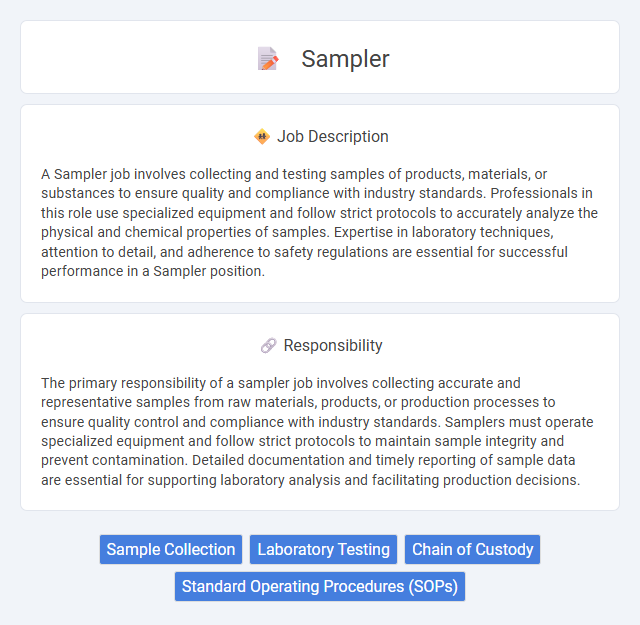
A Sampler job involves collecting and testing samples of products, materials, or substances to ensure quality and compliance with industry standards. Professionals in this role use specialized equipment and follow strict protocols to accurately analyze the physical and chemical properties of samples. Expertise in laboratory techniques, attention to detail, and adherence to safety regulations are essential for successful performance in a Sampler position.
People with strong communication skills and a friendly demeanor are likely to be well-suited for a sampler job, as it often involves direct interaction with customers. Those who can handle repetitive tasks and maintain enthusiasm throughout the day might find this role fitting. Individuals who prefer dynamic environments and can work under varying conditions may have a higher probability of success in this position.
Qualification
A Sampler must possess strong attention to detail and a solid understanding of sampling techniques relevant to their industry, such as chemical, soil, or product sampling. Proficiency in using sampling equipment and adherence to safety protocols are essential qualifications for accuracy and reliability. Certification in quality control or laboratory analysis enhances a Sampler's ability to maintain compliance with industry standards.
Responsibility
The primary responsibility of a sampler job involves collecting accurate and representative samples from raw materials, products, or production processes to ensure quality control and compliance with industry standards. Samplers must operate specialized equipment and follow strict protocols to maintain sample integrity and prevent contamination. Detailed documentation and timely reporting of sample data are essential for supporting laboratory analysis and facilitating production decisions.
Benefit
Sampler jobs likely offer the benefit of gaining hands-on experience in product testing and quality control, which can enhance practical skills valuable in various industries. There is a good chance that working as a sampler improves attention to detail and analytical abilities, contributing to career growth opportunities. This role might also provide networking prospects with professionals in manufacturing or food technology sectors.
Challenge
Sampler jobs likely present significant challenges related to precision and consistency, as accurate data collection is essential for reliable results. The role may require adaptability to varying environments and conditions, increasing the complexity of tasks. High attention to detail is probably critical to avoid errors that could compromise the entire sampling process.
Career Advancement
A Sampler job offers critical experience in data collection and quality control, serving as a strong foundation for career advancement in industries such as manufacturing, biotechnology, and environmental science. Mastery of sampling techniques and data analysis can lead to roles in quality assurance, laboratory management, or technical supervision. Continuous skill development and certifications in data integrity or laboratory standards significantly enhance promotion prospects and professional growth.
Key Terms
Sample Collection
Sample collection in a sampler job involves accurately obtaining materials or substances from designated sources to ensure quality and consistency. Precision in handling various sample types, such as liquids, solids, or gases, is crucial to maintain integrity for laboratory analysis or quality control processes. Efficient documentation and labeling during sample collection support traceability and compliance with industry standards.
Laboratory Testing
Sampler jobs in laboratory testing involve the precise collection of samples from various materials such as soil, water, air, and industrial products to ensure representative analysis. These professionals operate specialized equipment and follow strict protocols to maintain sample integrity and prevent contamination. Accurate sampling is critical in laboratory testing to provide reliable data for quality control, compliance with regulatory standards, and scientific research.
Chain of Custody
Sampler jobs require strict adherence to the Chain of Custody protocols to ensure sample integrity and traceability throughout the testing process. Accurate documentation and secure transport of samples prevent contamination or tampering, maintaining validity for laboratory analysis. Implementing robust Chain of Custody procedures supports compliance with regulatory standards and enhances the reliability of test results.
Standard Operating Procedures (SOPs)
Sampler job adherence to Standard Operating Procedures (SOPs) ensures consistent sample collection, handling, and documentation across all stages of the process, maintaining sample integrity and reliability. SOPs for samplers detail step-by-step instructions on equipment calibration, contamination prevention, and accurate labeling, which are critical for traceability and quality control. Compliance with these procedures minimizes operational errors and supports regulatory requirements, enhancing overall data accuracy and operational efficiency.
 kuljobs.com
kuljobs.com